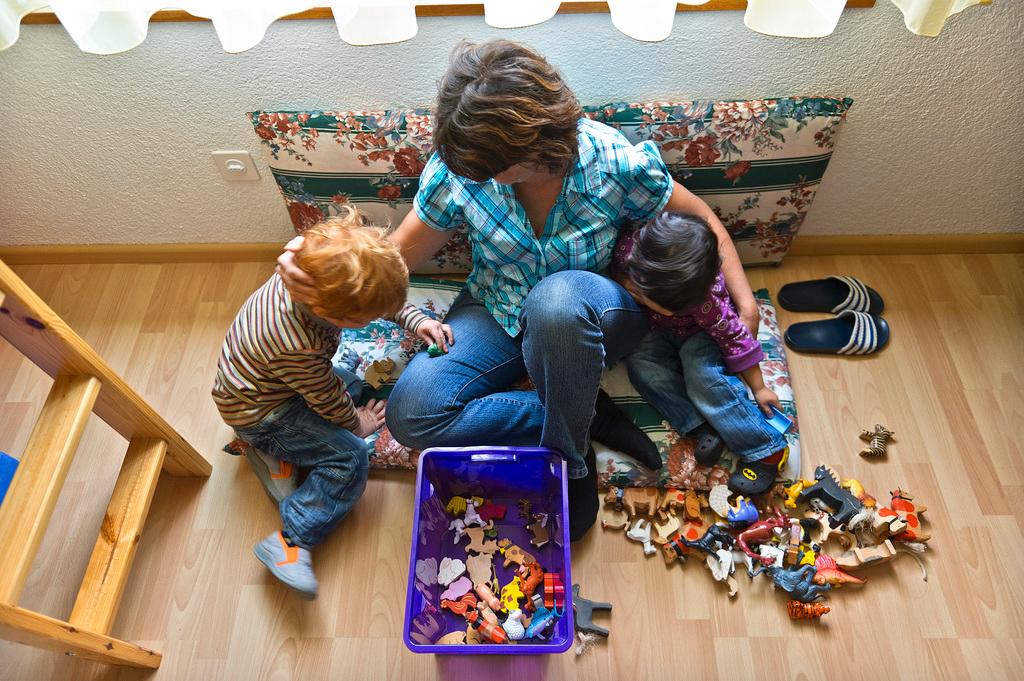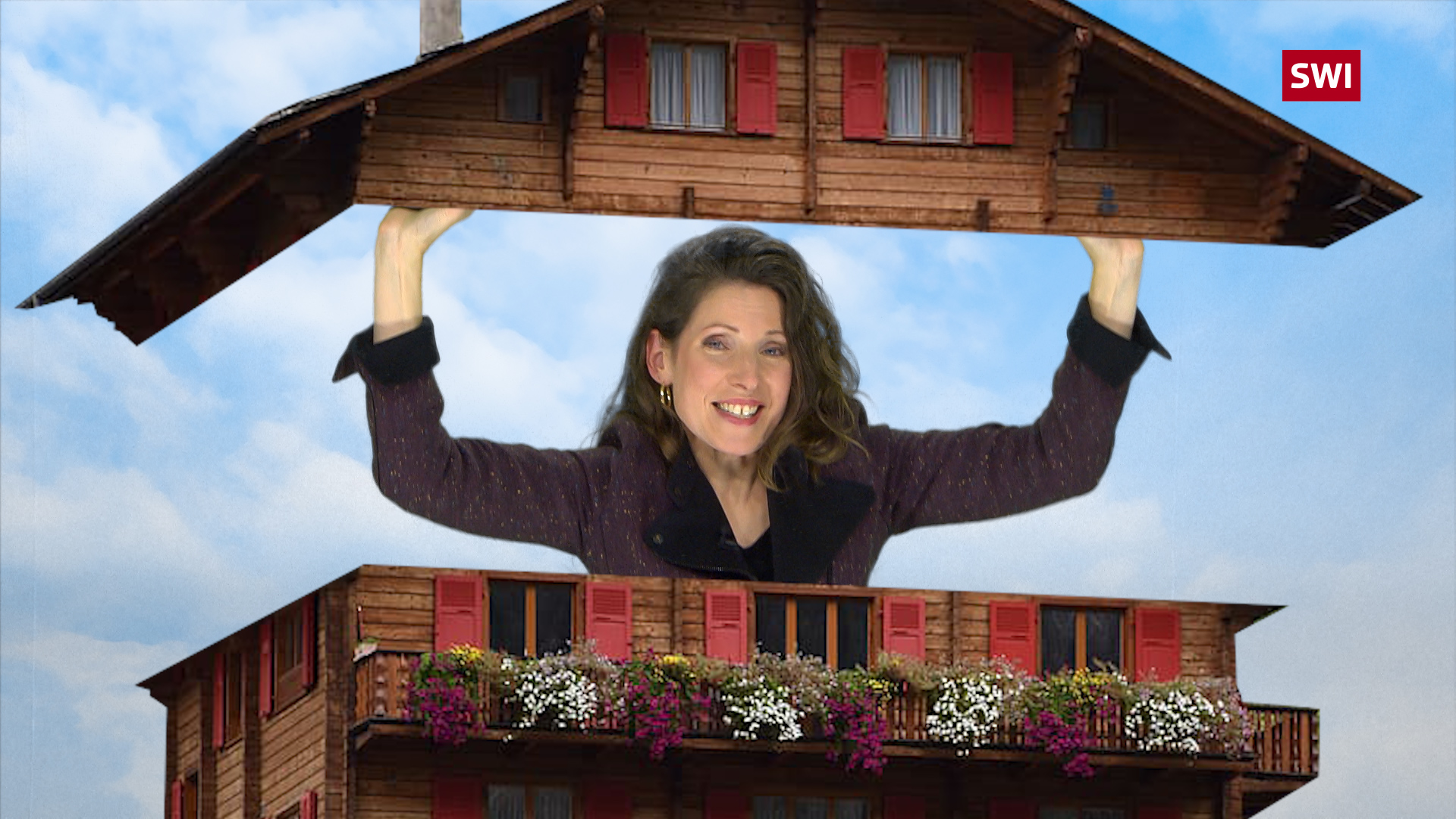
Children and childcare

Switzerland remains a relatively conservative country, with the mother tending to handle the majority of childcare responsibilities. But an increasing number of women in Switzerland are combining work with motherhood.
Having children
Mothers employed in Switzerland are entitled to 14 weeks of statutory maternity leaveExternal link at 80% of pay, beginning at the birth of the child. Many employers voluntarily offer more generous terms. Fathers were granted two weeks paternity leave in 2020.
Family sizes tend to be small in Switzerland; the fertility rate is 1.47 children per woman, while the average age of a woman having her first child is 30.9. One-quarter of births take place outside the framework of marriage.
Swiss hospitals proactively support breastfeeding. Some 95% of mothers begin breastfeeding their babies in hospital, and 80% are still breastfeeding at four months. Employers are obliged to provide time and space for breastfeeding mothers to pump milk or breastfeed.

More
Switzerland: home to the world’s most expensive crèches
Cantonal health authorities offer a drop-in health consultation service (‘Mütterberatung’ or ‘Consultations en puériculture’) to new parents for a nominal one-off fee. Parents can bring their children and speak with a nurse about feeding, weight gain, development, etc.
Work and childcare options
The majority of mothers of young children in Switzerland work part-time if they work at all, which means that childcare solutions are mostly tailored to part-time hours. Fathers are increasingly also taking up the option of working part-time, to minimise the need to find childcare – a culturally important goal for many Swiss people.
Just under 20% of men in Switzerland work part-time, and the practice is becoming more and more socially and economically acceptable.
Swiss working parents often rely on the help of grandparents to help care for their children, but this is not usually an option for people relocating to Switzerland.
Finding suitable childcare is always a challenge for working parents, and all the more so in a foreign country. Many parents complain that Swiss childcare is expensive and too limited.
That said, there are several childcare options in Switzerland and many families make use of a combination of services.

More
Living and working in Switzerland
Day care (Krippe or KiTa in German, crèche in French)
There are more than 2,000 crèches in Switzerland, about 90% of which are privately run. They may receive government grants but are primarily financed by parent contributions, although the fees are usually also subsidised by the canton according to a scale based on income.
Crèches operate in units of half-days, usually with a minimum attendance requirement of three half-days per week. Private crèches cost CHF60-CHF150 ($59.50-$149) a day in the cities of Bern and Zurich. A subsidised place for a low-income family can cost as little as CHF10. Most crèches offer small sibling discounts.
Childminders (Tagesmutter, maman du jour)
Another option is to have your child cared for in a home environment by a “day mother”. These are often mothers of older children who fit child-minding duties into their routine.
The rates are surprisingly low for this type of childcare, ranging from CHF5 to CHF12 per hour per child, with food billed separately. Day mothers are registered with local organisations which deal with parents’ applications and set regulations. Some also manage the billing. Depending on the canton, there may also be income-based subsidies.
See the Swiss Childcare FederationExternal link for more information on the different types of childcare in German, French, and Italian.
Au pairs
Citizens of the European Union can take up work in Switzerland without first securing a permit. If you are thinking of hiring a summer au pair, someone whose job lasts less than three months can even work without a permit. However, Swiss authorities have recently introduced a measure to favour hiring Swiss over non-Swiss people.
See here for more details on work permits.
It is illegal to employ someone in your home without paying social insurance contributions and making sure they have health and accident insurance. A family in Switzerland that wants to employ an au pair from a country outside the European Union must work with one of the placement agencies recognised by the State Secretariat for Economic Affairs. You can search for a list of such agencies hereExternal link.
Expect to pay a monthly stipend of CHF700 to CHF800 to the au pair depending on family size and the au pair’s age. According to Swiss law, au pairs may work no more than 30 hours per week, at five or six hours per day depending on how the work is distributed.
Nannies
For families that wish to have a qualified professional caring for their children, a nanny is another option. Depending on qualifications and experience, a nanny working full-time could expect to earn CHF3,800 to CHF5,000 per month, to be negotiated between the parents and the nanny.
Babysitters
The Swiss Red CrossExternal link offers a babysitting course to young people from the age of 13 via its cantonal branches across Switzerland. They also have a platformExternal link where those looking for a sitter can search a database of potential minders.
There are set tariffs for teenagers who have completed the course, ranging from CHF7 to CHF10 per hour, depending on the age of the sitter and the time of day. An adult babysitter will cost more. Wages can often be negotiated.
Schoolchildren
Once registered with a commune, children are entitled to go to the school for their catchment area.
Primary school hours in Switzerland can make things complicated for working parents.
Children attend school in the morning and afternoon with a two-hour break for lunch. Traditionally the school closes for the lunchtime break and teachers and children go home for lunch.
In recent years, in recognition of the changing reality for families, some schools have introduced full-day “Tagesschule” schools, providing children with a hot meal and care on the school premises while the school is closed.
Schools that do not offer the Tagesschule model often work in partnership with an independent child care provider nearby, where the children can be looked after before school, during the lunch break, and after school. Parents must apply for places in advance and the prices are generally based on income.
Despite these changes, many schools still have no special arrangements in place for childcare outside school hours. Some working parents organise lunchtime cover swaps with other parents. Day mothers (see above) are another source of lunchtime cover.
When planning childcare for school children, it is important to bear in mind that children of different ages may have different mornings and afternoons off, or in some cases one day per week without school.
The school year begins between mid-August and mid-September in the whole of Switzerland. School children have around 13 weeks of holiday per school year. The dates are set by the cantons and communes, and vary from region to region.

In compliance with the JTI standards
More: SWI swissinfo.ch certified by the Journalism Trust Initiative






























You can find an overview of ongoing debates with our journalists here . Please join us!
If you want to start a conversation about a topic raised in this article or want to report factual errors, email us at english@swissinfo.ch.